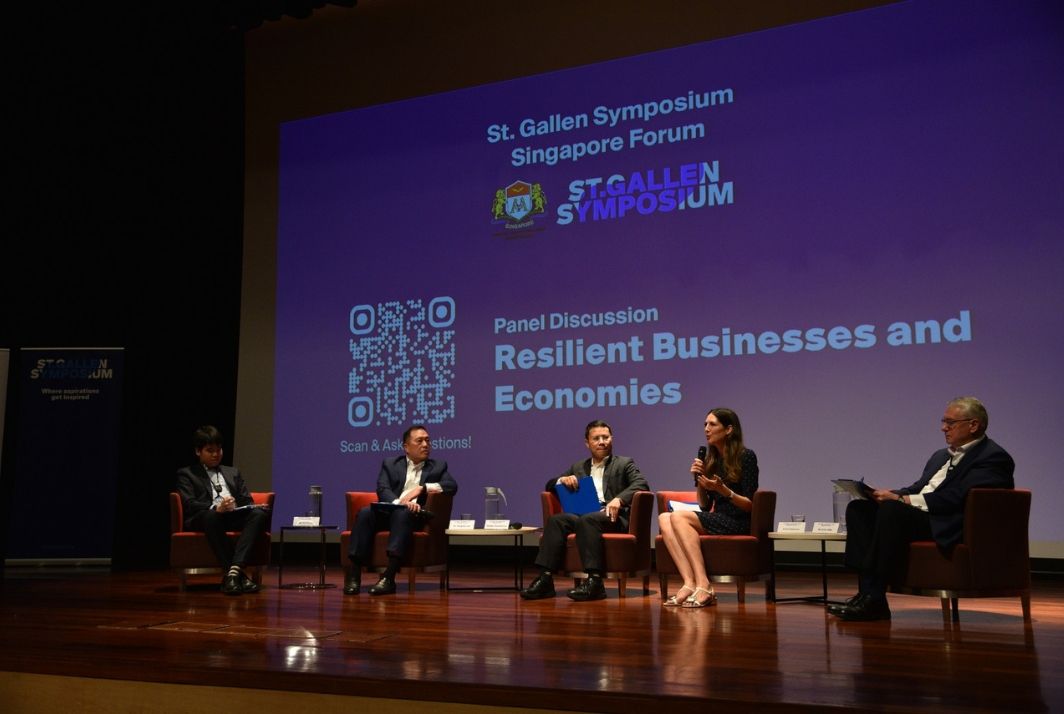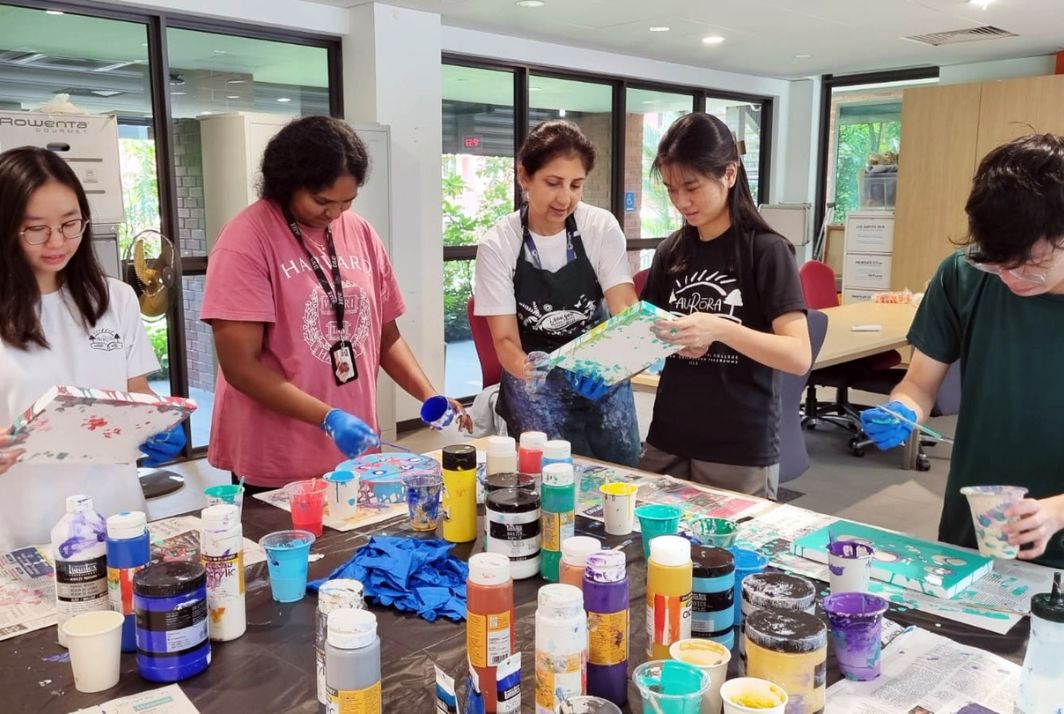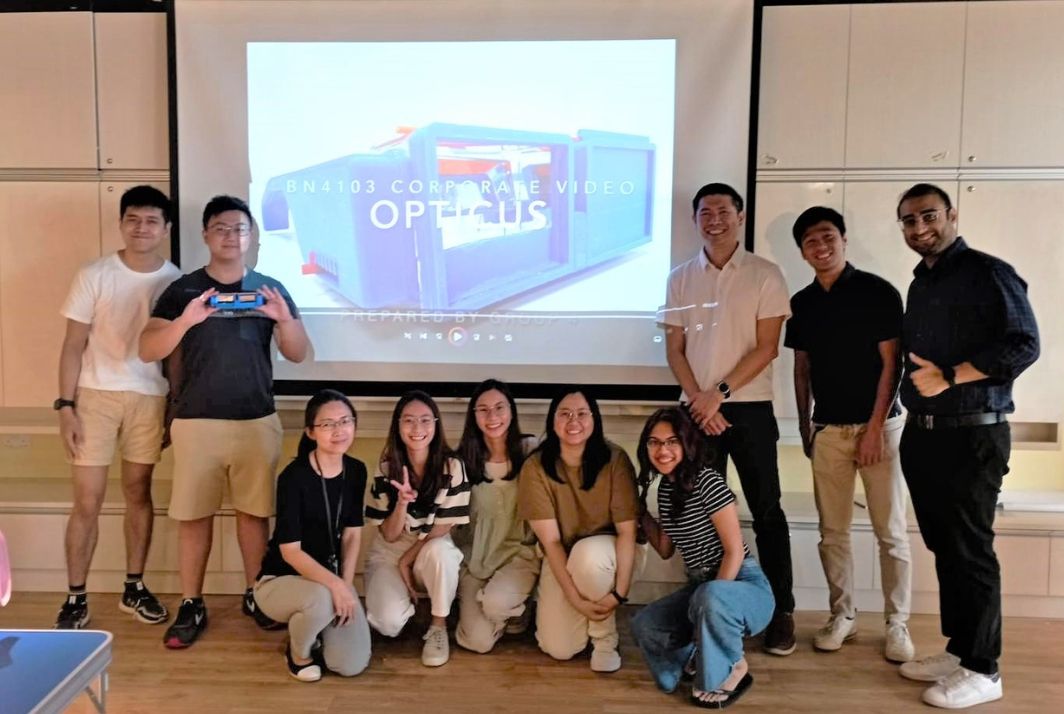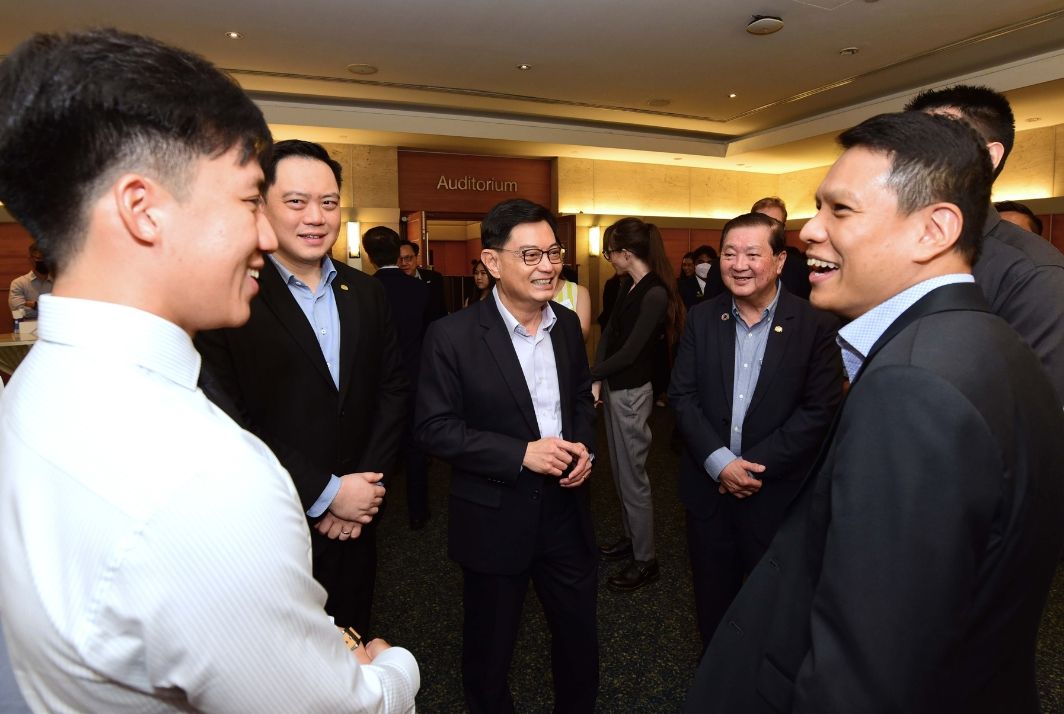Themed “Resilient Business and Economies”, the audience had the opportunity to engage with the panel on global issues of our time – including resilience in a post-pandemic era, urban development and public housing, and balancing trade-offs between short-term urgent priorities and long-term goals.
The panelists spanned across broad sectors from government, financial services, healthcare and commerce – with Minister for National Development Desmond Lee, chief executive officer of HSBC Singapore Mr Wong Kee Joo, president of Novartis Asia Pacific, Middle East and Africa Dr Iris Zemzoum, and chief executive of Singapore International Chamber of Commerce Mr Victor Mills. The discussion was moderated by Tommy Koh, a Leader of Tomorrow at the 48th and 49th St Gallen Symposium and NYAA Gold Award Holder (2022 cohort).
Panel Discussion: Resilient Businesses and Economies
Q: What might resilience look like planning for urban development in the longer term and preserving optionality, which is important at the national level, and individual fields and sectors as well as organisations?
Said Mr Victor Mills: “Resilience is an attitude. It's an attitude of the mind and is intentional. Minister Lee talked about resilience in the form of planning for the future, and doing it in an intentional way, doing it in a way that is selfless rather than selfish. And I think it's the same in any business. A business wants to continue to survive, and therefore, plans to do so. From my perspective of running a chamber, which represents lots of different businesses, it is really the value that we can bring to our members in order for us to achieve what's next.”
Added Mr Wong Kee Joo: “In terms of the perspective of the financial services, we are very fortunate to have invested a lot into digitization regarding industrial tools. That created a level of resilience in the financial system, and I can’t imagine if today COVID-19 had hit and none of us would be prepared, and everyone would still be there to take out their cheque books and doing payments using notes. We would have put ourselves in a very, very difficult position. From a financial perspective, resilience comes into mind when we look at our ability to be nimble and adapt to change and take bold moves to increase the tensile strength of our system.
Q: What is one provision or one principle in an intergenerational contract that you think is important to maintain economic or social resilience?
Minister Desmond Lee replied: “It would be a combination of strategy and trust. The mindset of stewardship means that each generation will see the other person, you don't just think about yourself and your generation. You have a duty towards other generations both ahead of you and after you. Trust is critical.”
Dr Iris Zemzoum alluded to the importance of being agile during times of uncertainty.
She said: “In the healthcare industry, purpose is at the heart and our purpose is to bring innovative medicines to patients and to meet their needs. And you only can do that if you have a very clear vision of how you can create value to the society and knowing that our environment is changing at a rapid pace, the one thing that will enable us to pursue our vision and our purpose is agility and I'm going to refer again to the pandemic crisis, we know today that if you are not agile in adapting to the changing environment, we can have the best purpose and the best vision, but we won't be able to succeed.”
Mr Mills added a commerce perspective to the conversation: “What we all need is collaborative innovation. The collaborative innovation is further enabled by age blindness. In other words, see the fellow human being first, not the age. It’s something that we are doing very well in Singapore. We don't discriminate based on race. We don't discriminate based on belief. What we do is we include and celebrate the differences that exist. And I think that would be a wonderful way to enable collaborative innovation that we all desperately need to deal with the existential threat surrounding us, whether it be climate change, or any other.”
Q: As the jetsetter of the world's national development, what are some core values other nations could embrace from Singapore to become a more sustainably resilient state?
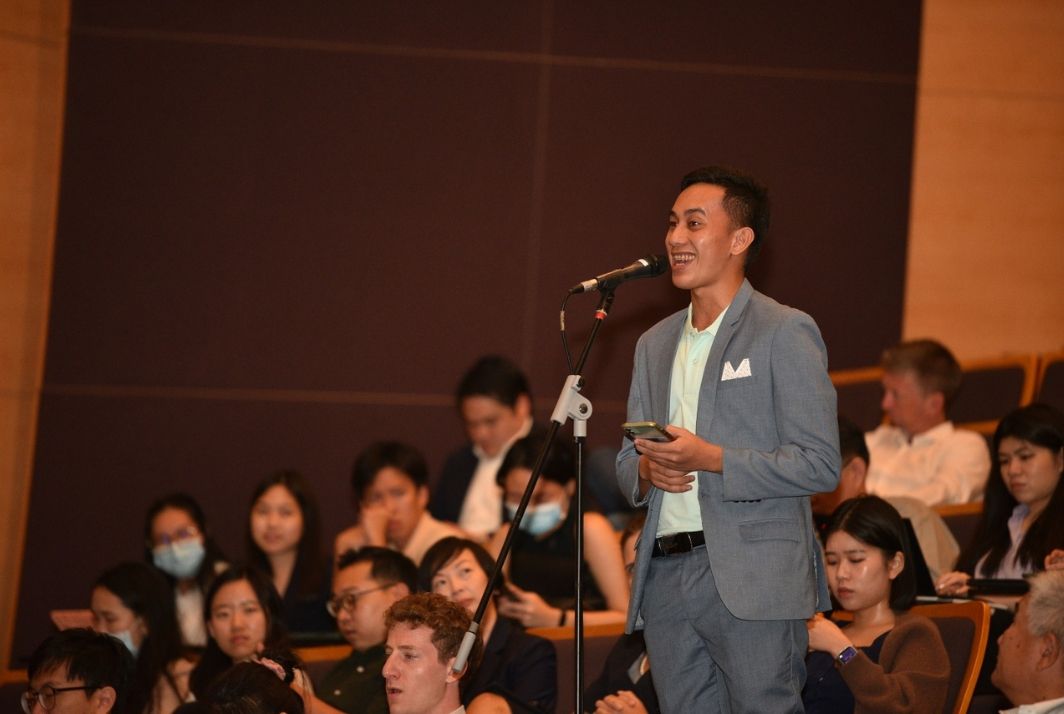
Minister Desmond Lee said: “The first thing we do is recognize that we are a small city-state and countries around us are all far larger, and so we don’t purport to teach others. We look after our city; we have a responsibility to our people. We try to do it to the best of our ability. So, the key to us having been able to move this city together is building trust and making sure that very limited resources are shepherded and stewarded. Land in Singapore is limited and natural resources are non-existent. So, everything you have is a function of the drive and the power of the cities, people.”
“Careful planning, whether it is the length to use, or a robust healthcare and housing system, has been a strategy that has served us well. I think just putting our things together, working with people, planning carefully and in view of the longer term, has enabled the city to function the way it has. And we hope to contribute the little that we have learnt over the decades to forums such as the World City Summit and through inviting mayors and cities from other provinces to come to Singapore and see what we do. This is also a wonderful opportunity for us to learn from cities all around the world as well. So, there is mutual respect, mutual trust, mutual learning of each other.”
Mr Victor Mills elaborated: “The enabler of all those things that we had just spoken about is intentional people-centric governance. If I look at the moments of Singapore from the time the Republic was established in 1965, that is the overwhelming characteristic that drives everything else, that then creates the trust that sustains us and our society. It also goes to this point about mutual learning where not just from Singapore, but we also learn from our regional or global counterparts to see what they're doing in order to hold them to those people-centric governance principles that we talk about.”
Q: From a political and business perspective, how do you balance addressing the short-term challenges while thinking about the future in the long term. Do you see a trade-off between that?
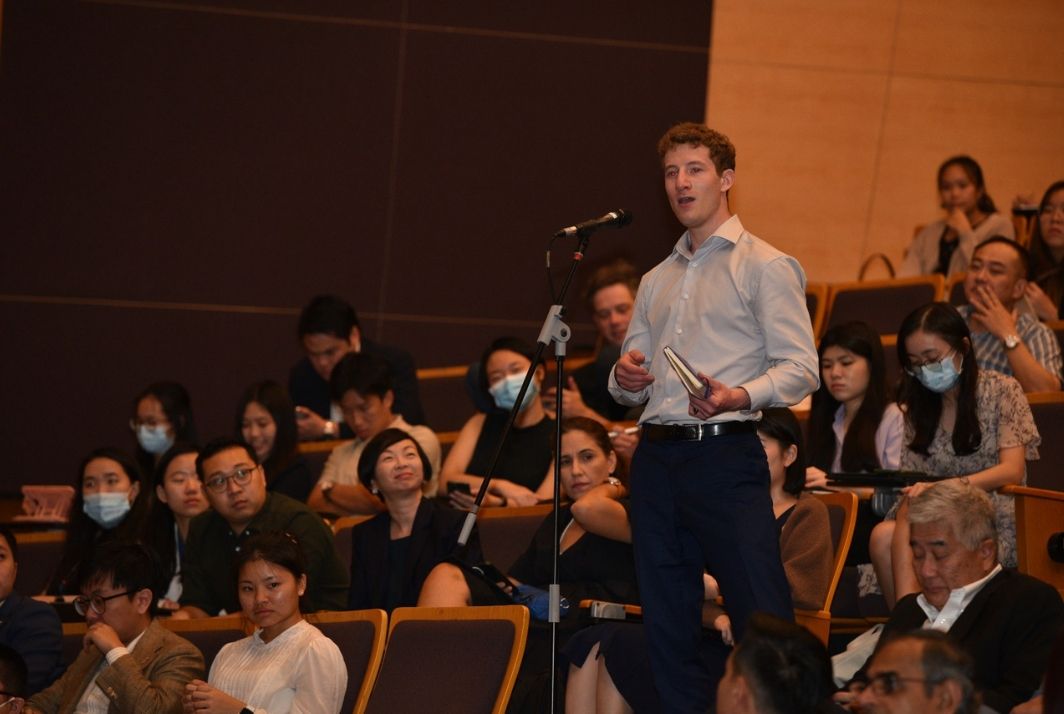
Dr Iris Zemzoum responded: “Whether it's the short-term or long-term objectives, you do not have to choose between the two. You're absolutely able to choose both, if you have a very clear vision of where you want to go. You still have to live in the day and plan for the day and make sure and independently of which industry you're in, or whether you're in a government, to have a very clear vision of what you want to achieve, what are the priorities and what you need to do today to still be able to sustain what you’ve planned for the future.
Q: If there was going to be one tangible action that the young people who are leaders of today, as well as the leaders of tomorrow in the room here will be able to undertake after walking out of the doors of the St. Gallen Symposium Singapore forum this evening, what would that one action be?
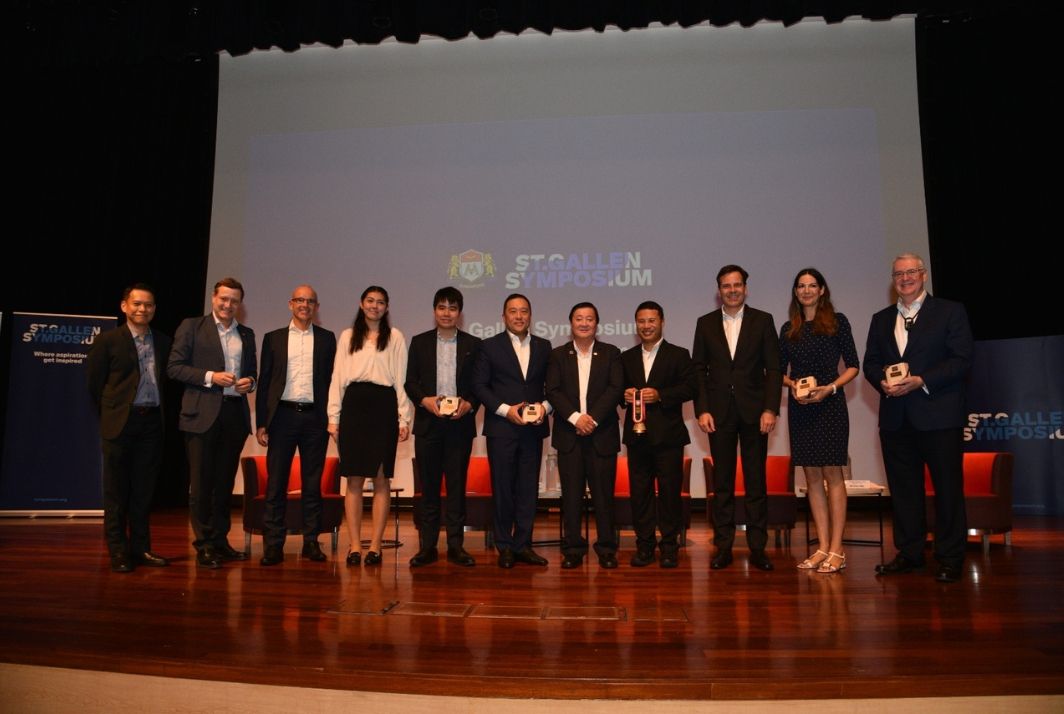
Said Mr Wong Kee Joo: “Speak up, get involved, don’t feel like you don’t have a voice. All generations can contribute and must contribute for our future. We are all stewards of the economy."
Dr Iris Zemzoum added: “Mentor the most senior leaders. This is what we do with our organization, reverse mentorship. And it's wonderful. Have the courage to do that.”
Said Mr Victor Mills: “Collaborate with humility. We are all imperfect human beings. And I think it's important to keep that in mind. Also, don't make assumptions, test your assumptions."
Minister Desmond Lee conclude the panel discussion with a parting counsel:
“Seek deeper understanding, for example, in our fast-paced social media world and shorter attention span. Second, seek broader diversity apart from echo chambers – where you surround yourself with people whom all have the same viewpoints. Search for diverse groups, search for people with opposing viewpoints, this will make a difference.”
Read our coverage of the first part of the St. Gallen's Symposium Singapore Forum here.
Share:
Contributor
Shanice Poh, Year 3, NUS Business School
Photos courtesy of the National Youth Achievement Award (NYAA) Council


